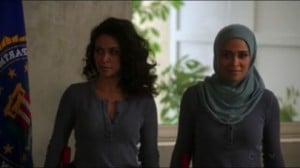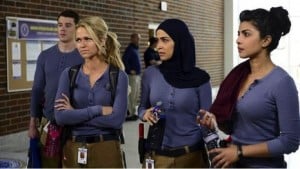Last night, as I was flipping through the channels, I stopped on the Spike network, which is geared toward a male audience (well, most television is geared toward a male audience, but that’s a different soapbox). Perhaps I should say heavily geared toward a male audience. I mean, between the James Bond marathons, Axe commercials, and ultimate fighting programs, it starts to get a little, uh, over-done. The same way the Lifetime network’s pregnancy test commercials and movies about victimized women start to get ridiculous.*
Anyway, let’s get to the real reason I stopped on this channel. TNA Impact is basically another one of Spike’s wrestling programs, and it was this program that caught my attention. Because there was a woman in a niqab wrestling.
Really!
After digging around online, I found out who she was: her stage name is Raisha Saeed. Saeed’s biography details that she is from Damacus, Syria, and manages another female wrestler, Awesome Kong. Rooting around a little more, I find out that she is not, in fact, Muslim (put on your surprised face!) or Syrian.
Her real name is Melissa Marie Anderson. She usually goes by the stage name of Cheerleader Melissa, and has a very long and impressive wrestling career.
I wasn’t able to figure out why Ms. Anderson, who has two other stage names, would don a niqab, a fakey Arab accent and broken English, and an Arab (-sounding) stage name. Wrestling programs are full of gimmicky personas, and so I’m assuming that’s what this is, too. From the mysterious Arab music that plays when she enters the ring to her MySpace page, it’s one huge (racist) gimmick.
TNA Impact had an “interview” with Saeed and the female wrestler she manages: a black woman whose stage name is Awesome Kong. During the interview, Saeed speaks for herself and as a mouthpiece for Kong, who just sat there and actively looked menacing. And, of course, Saeed’s niqab came up in the interview.
The interviewer asks, “One of the aspects, I think, of your mystery comes from the dress you wear. What is the story behind the burka?”
“My burqa is none of your concern.”
Nevermind that it’s a niqab, not a burqa. Past this, however, no mention of her clothing or of Islam enters into the stage persona. In the admittedly limited clips I’ve seen, there is no mention of jihad or death to infidels–things that usually come up in racist portrayals of Arabs and Muslims. Thankfully, Islam seems to be left alone, aside from her headgear and the fact that, as a gimmicky Arab wrestler, she has committed the played-out conflation of Arab = Muslim.
But the racism doesn’t go away: another interview, Saeed refers to Kong as a “monster” who other wrestlers should not provoke. And then throws in a few garbledy Arabic phrases.
http://www.youtube.com/watch?v=ZciLb6FPgdc&NR=1Despite the fact that Islam is not an overt part of Saeed’s persona, it’s alluded to in a match between Saeed and Taylor Wilde, in which the overtones of “culture-clash” can hardly be ignored. A blonde-blue eyed wrestler with the American flag motif on her wrestling outfit battles a niqab-wearing (and thus Muslim) Arab wrestler? A bit obvious, wouldn’t you say?
http://www.youtube.com/watch?v=xw7Nz3NePl4Wrestling history is full of racist imagery, from The Iron Sheik to Sapphire. So neither Kong nor Saeed should come as a huge surprise. But that doesn’t make it any less offensive. Saeed’s character continues the designation of Arabs as Muslims, and Kong’s character stirs up characterizations of blacks as animalistic and savage. It’s just so played that it’s almost funny (aside from the general hilarity of the choreographed ballet known as wrestling).
Readers, what do you think of all this?
*Note: Don’t even start with me on the Lifetime channel. I’m not saying that movies about domestic violence aren’t important or that what happens to these women isn’t a real problem. My point is that Lifetime doesn’t do these women any favors by always portraying women as victims and nothing but.











